
David Warren Brubeck was an American jazz pianist and composer. Often regarded as a foremost exponent of cool jazz, Brubeck's work is characterized by unusual time signatures and superimposing contrasting rhythms, meters, tonalities, and combining different styles and genres, like classic, jazz, and blues.

Paul Desmond was an American jazz alto saxophonist and composer and proponent of cool jazz. He was a member of the Dave Brubeck Quartet and composed that group's biggest hit, "Take Five".

Joseph Albert Morello was an American jazz drummer best known for serving as the drummer for pianist Dave Brubeck, as part of the Dave Brubeck Quartet, from 1957 to 1972, including during the quartet's "classic lineup" from 1958 to 1968, which also included alto saxophonist Paul Desmond and bassist Eugene Wright. Morello's facility for playing unusual time signatures and rhythms enabled that group to record a series of albums that explored them. The most notable of these was the first in the series, the 1959 album Time Out, which contained the hit songs "Take Five" and "Blue Rondo à la Turk". In fact, "Take Five", the album's biggest hit was specifically written by Desmond as a way to showcase Morello's ability to play in 5
4 time.

At Carnegie Hall is a jazz live album by the Dave Brubeck Quartet. It was recorded at the famed Carnegie Hall in New York City on Friday, February 22, 1963. Critic Thom Jurek described it as "one of the great live jazz albums of the 1960s". Critic Jim Santella wrote, "This is timeless music from a classic ensemble. Goosebumps are guaranteed."
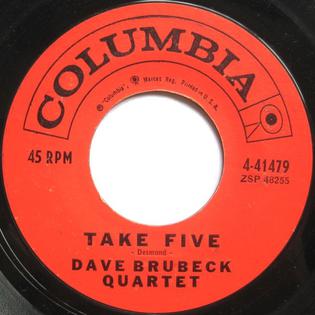
"Take Five" is a jazz standard composed by Paul Desmond. It was first recorded in 1959 and is the third track on Time Out by the Dave Brubeck Quartet. Frequently covered by a variety of artists, the track is the biggest-selling jazz song of all time and a Grammy Hall of Fame inductee.
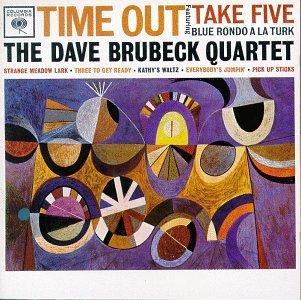
Time Out is a studio album by the American jazz group the Dave Brubeck Quartet, released in 1959 on Columbia Records. Recorded at Columbia's 30th Street Studio in New York City, it is based upon the use of time signatures that were unusual for jazz such as 9
8, 6
4 and 5
4. The album is a subtle blend of cool and West Coast jazz.
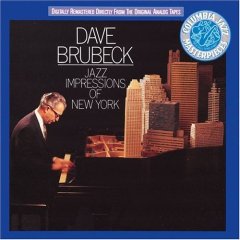
Jazz Impressions of New York is a jazz album released by Dave Brubeck. The compositions were for the television show Mr. Broadway.

Time Further Out is a jazz studio album by the Dave Brubeck Quartet released by Columbia Records in November 1961. It features the "classic" lineup of the quartet: pianist and leader Dave Brubeck, alto saxophonist Paul Desmond, bassist Eugene Wright, and drummer Joe Morello. The album was recorded by engineer Fred Plaut and produced by Teo Macero.
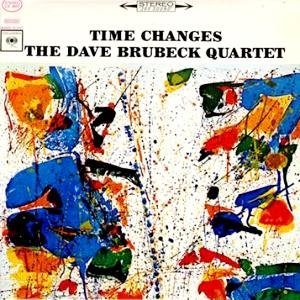
Time Changes is a 1964 album by The Dave Brubeck Quartet, based upon the use of time signatures that were unusual in jazz music.
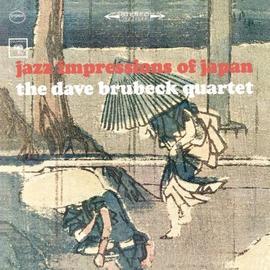
Jazz Impressions of Japan is a 1964 album by The Dave Brubeck Quartet. It was recorded on June 16–17, 1964 at the CBS 30th Street Studio, except for "Zen Is When" which was recorded on January 30, 1960. It was released on August 10, 1964. The album, as the back cover of the remastered CD confirms, had been long out-of-print until it was reissued on CD in 2001, then re-released in 2008 and 2009.

Time In is a 1966 studio album by Dave Brubeck, the last of Brubeck's 'Time' series.

Countdown—Time in Outer Space is a studio album released by the Dave Brubeck Quartet in 1962 on Columbia LP record CS 8575 (stereo) and CL 1775 (mono). The front cover features the 1959 painting Orange and Black Wall by Franz Kline. In Australia the album appeared on the Coronet label. It was re-released, for the first time in digital format, in 2004 as part of a compact disc collection titled Dave Brubeck: For All Time. It was again released as part of the box set The Dave Brubeck Quartet: the Columbia Studio Albums Collection 1955-1966. Both CD re-releases feature a bonus track titled "Fatha".
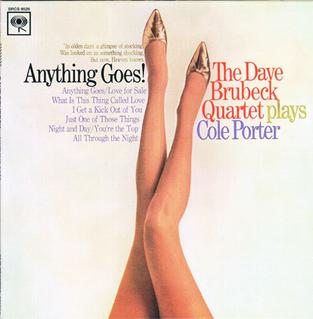
Anything Goes! The Dave Brubeck Quartet Plays Cole Porter is a 1967 studio album by Dave Brubeck and his quartet of music by Cole Porter, recorded between December 8, 1965 and February 17, 1966.

Brandenburg Gate: Revisited is a studio album by The Dave Brubeck Quartet accompanied by an orchestra arranged by Howard Brubeck.
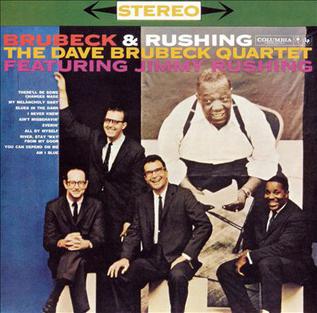
Brubeck and Rushing is a 1960 album by The Dave Brubeck Quartet and the singer Jimmy Rushing.

Bravo! Brubeck! is a 1967 live album by Dave Brubeck and his quartet, recorded during their tour of Mexico. The quartet were augmented by Chamin Correa on guitar, and the bongo and conga player Salvatore Agueros. It was released in 1967.
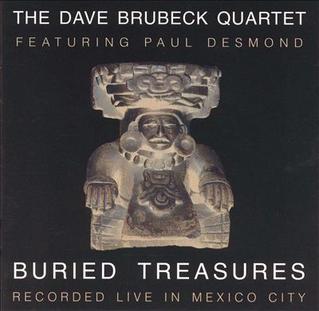
Buried Treasures is a 1967 live album by Dave Brubeck and his quartet, recorded during their tour of Mexico. It was released in 1998. A second live album recorded on their tour, Bravo! Brubeck!, was released in July 1967.

Jazz: Red Hot and Cool is a jazz live album by The Dave Brubeck Quartet. It was recorded during one 1954 and two 1955 performances at the Basin Street East club in New York City. Released originally in 1955, this album was remastered and reissued in 2001, while adding two tracks that were not included in the original album.

Jazz Impressions of Eurasia is a studio album by pianist Dave Brubeck and his quartet recorded after, and inspired by, their 1958 world tour sponsored by the American state department during which they played 80 concerts in 14 countries, including Turkey, Iran, Iraq, India, Pakistan, and Afghanistan, over three months. In the liner notes to the album, Brubeck notes that "These sketches of Eurasia have been developed from random musical phrases I jotted down in my notebook as we chugged across the fields of Europe, or skimmed across the deserts of Asia, or walked in the alleyways of an ancient bazaar. ... I tried to create an impression of a particular locale by using some of the elements of their folk music within the jazz idiom." The album was recorded in July and August 1958 at the Columbia 30th St. Studios in New York.

Their Last Time Out: The Unreleased Live Concert, December 26, 1967 is a 1967 live album by Dave Brubeck and his quartet, recorded in Pittsburgh, Pennsylvania on December 26, 1967. It was first released in 2011 by Columbia Records in a double CD format.



















